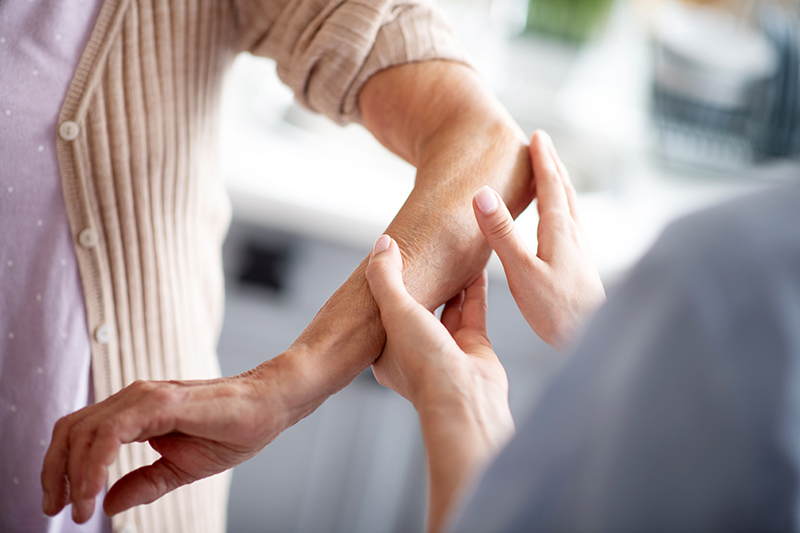Bio-degradable cards
Every card imaginable!
|
Bio-degradable cards Every card imaginable! Rheumatoid Arthritis Explained
DisclaimerThis guide is for informational purposes only and is not a substitute for professional medical advice, diagnosis, or treatment. It is based on general medical knowledge and reliable sources such as the NHS, Versus Arthritis, and the National Rheumatoid Arthritis Society (NRAS). Always consult a qualified healthcare provider, such as your GP or rheumatologist, for any personal concerns or symptoms. This information is accurate as of December 2025. Table of ContentsWhat is Rheumatoid Arthritis?Rheumatoid arthritis is a long-term autoimmune condition where the body's immune system mistakenly attacks its own healthy tissues, particularly the lining of the joints. This leads to inflammation that causes pain, swelling, and stiffness. It's not just a joint problem – it can affect how you feel overall and influence daily life in ways that vary from person to person. Many people feel shocked or worried when they first learn about rheumatoid arthritis, and that's entirely normal. The encouraging part is that treatments have advanced significantly, meaning most people now live active lives with good control over their symptoms when they get early support from healthcare professionals. How Rheumatoid Arthritis Differs from OsteoarthritisPeople often confuse rheumatoid arthritis with osteoarthritis, but they are quite different conditions.
It tends to affect joints on both sides of the body symmetrically. For example, if your right wrist is sore and swollen, your left wrist is likely to be affected too – the same might happen with knees, ankles, or fingers. Osteoarthritis usually picks on one side more or targets specific joints that have seen heavy use, like a knee from years of running. Symptoms can appear at a younger age in rheumatoid arthritis, commonly starting between 40 and 60, though it can begin earlier or later. Osteoarthritis is far more common in people over 65 and rarely causes the kind of morning stiffness that lasts for hours, which is typical in rheumatoid arthritis. What Happens Inside the Joints?The process begins when the immune system targets the synovium, making it inflamed and thickened. This extra tissue can release chemicals that damage cartilage, erode bone, and stretch ligaments or tendons over time. If inflammation continues unchecked, joints may eventually become deformed or lose function. Modern medications work by calming the immune system early on, which helps prevent much of this damage. Many people who start treatment promptly notice that their joints stay healthier for longer, avoiding the severe changes seen in the past. How Common Is It, and Who Does It Affect?In the UK, between 400,000 and 700,000 adults live with rheumatoid arthritis – that's roughly 1 in every 100 to 150 people.
Beyond the Joints: Other Ways It Can Affect the BodyWhile joints are the primary focus, rheumatoid arthritis is a whole-body condition for some people.
Rheumatoid Arthritis in ChildrenIf you're reading this because your child has joint swelling or stiffness, rest assured it's almost certainly not the adult form of rheumatoid arthritis. Children under 16 can develop juvenile idiopathic arthritis (JIA), a related but separate condition affecting around 12,000 young people in the UK.
The Ups and Downs of the ConditionRheumatoid arthritis often follows a pattern of flares and quieter periods.
Thanks to better drugs and strategies, more people achieve remission nowadays than ever before. Starting treatment soon after symptoms appear makes a big difference in reducing flares and protecting joints long-term. Why Personalised Care MattersEveryone's experience of rheumatoid arthritis is unique – some have mild, occasional symptoms, while others need more intensive support. This variability is why close partnership with your GP, rheumatologist, and nurse specialist is so valuable. They can adjust your plan as needed, helping you maintain the quality of life you want. 
Symptoms and How It Affects Daily LifeSymptoms of rheumatoid arthritis can differ greatly between people, and they often change from one day to the next – even for the same person. They might build up slowly over weeks, or in some cases appear more quickly. It's completely normal to feel uncertain or worried when these signs first show up; many people wonder if something serious is happening, and reaching out to your GP early can bring clarity and relief. Common Early SignsRheumatoid arthritis often starts in the smaller joints, such as those in the fingers, wrists, or toes, and it typically affects both sides of the body in a similar way.
Other early symptoms might include overwhelming fatigue that doesn't fully lift with rest, a general sense of being unwell, mild fever, or even reduced appetite. These can make you feel like you're coming down with flu, but without the usual cold symptoms. How Symptoms Can ProgressIf inflammation isn't managed early, joints may gradually become less mobile or change shape over time – for instance, fingers might start to drift outwards or grip strength can weaken. Thankfully, with today's treatments started promptly, many people avoid these longer-term changes and keep their joints functioning well. Flares and Quieter PeriodsRheumatoid arthritis is known for its ups and downs: symptoms often worsen during flares that can last days, weeks, or longer, then settle into quieter times or even remission, where they barely trouble you.
The Impact on Daily LifeLiving with rheumatoid arthritis means finding ways to adapt when symptoms interfere with routine activities – and on tougher days, even simple tasks can feel demanding.

Causes and Risk FactorsDoctors and researchers still don't know the exact cause of rheumatoid arthritis, but it's clear that it develops from a complex mix of factors – your genes, things in your environment, and sometimes specific triggers that tip the immune system into overdrive. In simple terms, the body's defence system, which is meant to fight infections, gets confused and starts attacking the lining of your own joints instead. This isn't something anyone brings on themselves, and it's certainly not contagious. It's natural to wonder why this has happened to you or someone you care about. The truth is, it's often just an unfortunate combination that no one could have predicted or prevented with current knowledge. The good news is that understanding these factors better is helping doctors manage the condition more effectively, and ongoing research may one day lead to ways to stop it before it starts. The Role of GeneticsGenes are part of the picture, but they don't seal your fate – they just make some people more susceptible.
Environmental and Lifestyle InfluencesSeveral outside factors have been strongly linked to rheumatoid arthritis, and some are things you can influence.
Emerging Research and Hope for the FutureScientists now believe the immune system changes that lead to rheumatoid arthritis can begin many years – sometimes a decade or more – before any joint pain appears. Blood tests in research studies have detected early signs like specific antibodies or immune cell activity long before symptoms. This quiet build-up offers real hope. Researchers are working on ways to identify people at high risk early and perhaps intervene before joints are damaged. While prevention isn't possible yet, these advances mean treatments are becoming more targeted and effective, giving people better control and fewer long-term problems. Understanding that rheumatoid arthritis isn't your fault – and that many risk factors are shared with other common conditions – can help ease any sense of blame. Focusing on what you can influence, like not smoking and staying a healthy weight, along with early medical support if symptoms appear, puts you in the strongest position. 
DiagnosisGetting a diagnosis of rheumatoid arthritis isn't always straightforward, as early symptoms can mimic many other conditions, like viral infections, osteoarthritis, or even fibromyalgia. This waiting period can feel frustrating and worrying – it's completely normal to feel anxious while tests are done and results come back. The important thing to remember is that doctors take these symptoms seriously, and reaching a clear diagnosis as soon as possible makes a real difference to outcomes. In the UK, guidelines from NICE (National Institute for Health and Care Excellence) aim to speed things up: if your GP suspects inflammatory arthritis like rheumatoid arthritis, they should refer you urgently to a specialist rheumatologist, ideally within three weeks. Early diagnosis and treatment are crucial because they can significantly reduce the risk of long-term joint damage and help you feel better sooner. What Happens When You First See Your GP?Your doctor will begin by listening carefully to your description of symptoms and asking detailed questions – how long they've lasted, which joints are affected, whether stiffness is worse in the mornings, and if both sides of the body are involved similarly. They'll then do a physical examination, gently checking your joints for swelling, warmth, tenderness, or limited movement. They might watch how you walk or ask you to make certain movements with your hands or wrists. This simple check often gives strong clues about whether inflammation is present. Based on this, your GP will usually arrange initial tests straight away and make that urgent referral if needed. Key Tests Used to Help Diagnose Rheumatoid ArthritisThere's no single "yes or no" test for rheumatoid arthritis – diagnosis is based on a combination of your symptoms, examination findings, blood results, and sometimes scans.
Your rheumatologist will review all these results together with your symptoms to reach a confident diagnosis. They may repeat tests or monitor you over a few weeks if things aren't completely clear at first. What If Blood Tests Are Negative?Some people receive a diagnosis of seronegative rheumatoid arthritis – meaning the clinical picture fits perfectly (symmetrical joint inflammation, morning stiffness, response to treatment) but rheumatoid factor and anti-CCP tests come back negative. This form is just as real and valid as seropositive cases. Treatment and monitoring are very similar, and outcomes can be just as good with early care. The label mainly helps doctors understand possible patterns, but it doesn't change the core approach to supporting you. Diagnosis in ChildrenIf a child has persistent joint swelling, pain, or stiffness, the process is slightly different. GPs refer urgently to paediatric rheumatology specialists who are experts in childhood conditions. Diagnosis of juvenile idiopathic arthritis (JIA) follows similar steps – careful history, examination, blood tests for inflammation and antibodies, and often ultrasound or MRI – but always takes growth, development, and age-specific patterns into account. Eye checks are routine too, as some forms of JIA can affect the eyes. Early specialist input is vital, and many children do extremely well with prompt treatment. Why Early Diagnosis Matters So MuchStarting effective treatment within the first few months of symptoms – often called the "window of opportunity" – can dramatically improve long-term results. It helps control inflammation before permanent joint changes occur, reduces pain and fatigue, and lets most people maintain normal activities. If you're waiting for appointments or results, try to keep track of your symptoms (a simple diary of pain levels and stiffness can be helpful for your specialist). In the meantime, gentle movement, warmth on stiff joints, and over-the-counter pain relief (as advised by your GP or pharmacist) may ease things temporarily. Reaching a diagnosis brings clarity and the start of proper support – many people feel a sense of relief once they know what's happening and have a plan in place. Your rheumatology team will guide you every step of the way. 
Treatment OptionsThe good news is that treatments for rheumatoid arthritis have come a long way in recent years, with many options now available that do far more than just ease pain – they can slow or even halt the disease, protect your joints from damage, and help you achieve periods of low activity or full remission. In the UK, the approach follows NICE guidelines and a "treat to target" strategy, where your rheumatologist regularly assesses your disease activity (often using a score like DAS28) and adjusts treatment until symptoms are well controlled. This personalised plan gives most people the chance to lead active, fulfilling lives. It's understandable if the range of treatments feels overwhelming at first – many people feel the same when discussing options with their doctor. Your rheumatology team will guide you based on your symptoms, how active the condition is, and any other health factors, starting with the most effective and suitable choices. The Treat to Target ApproachThis means aiming for the best possible outcome: ideally remission (where symptoms are minimal or absent) or at least low disease activity. Your progress is checked regularly – often every one to three months at first – with blood tests, joint exams, and discussions about how you're feeling. If the current treatment isn't hitting the target after a few months, it's adjusted by adding or switching medicines. This early, proactive method has transformed outcomes, helping prevent long-term joint damage for many. Main Types of MedicationsTreatment usually starts with disease-modifying antirheumatic drugs (DMARDs), which work to calm the immune system and reduce inflammation over time.
To bridge the gap while slower-acting drugs kick in, short-term steroids (like prednisolone) or non-steroidal anti-inflammatory drugs (NSAIDs) can quickly reduce pain and swelling. Painkillers such as paracetamol are also helpful for symptom relief, but they're not the core long-term treatment – the focus is on controlling the underlying inflammation. Regular blood tests are a key part of staying safe on these medicines, checking liver function, blood counts, and inflammation levels. Your team will explain what to watch for and adjust doses if needed. Supportive Therapies and Lifestyle SupportMedications work best alongside other approaches that help you stay mobile and independent.
When Surgery Might Be ConsideredFor a small number of people with severe joint damage despite good medical control, surgery can be transformative.
Combining Treatments for the Best ResultsMost people find a combination that suits them – perhaps a DMARD with a biologic or JAK inhibitor, plus physiotherapy and occasional pain relief. With close monitoring, many reduce flares significantly and enjoy long periods of remission. Ongoing research into even more targeted therapies continues to bring hope for the future. Your rheumatology team, including specialist nurses, is there to support you through trials and adjustments. Many people look back and feel relieved at how manageable the condition becomes with the right plan. If you're newly diagnosed or changing treatments, give yourself time to adjust – improvement is very possible. 
Managing Rheumatoid Arthritis Day to DayLiving well with rheumatoid arthritis is absolutely possible – it comes down to finding a good balance between your medical treatment, practical self-care strategies, and drawing on support when you need it. Many people discover that small, consistent changes make a big difference to how they feel and what they can do. Your rheumatology team will work with you to create a personalised plan, but day-to-day management often puts you in the driving seat. It's normal to have days when everything feels harder, especially during flares, and that's okay. Being kind to yourself and pacing activities helps prevent frustration and tiredness building up. Over time, most people find their own rhythm that keeps symptoms under control and lets them enjoy life. Pacing Yourself and Protecting Your EnergyOne of the most helpful strategies is learning to pace activities so you don't overdo things on good days and pay for it later.
Keeping Active with Gentle ExerciseRegular movement is one of the best ways to ease stiffness, maintain joint function, and boost mood and energy levels.
Eating Well to Support Your BodyA healthy, balanced diet gives your body the fuel it needs to manage inflammation and maintain energy.
Practical Ways to Protect Your JointsSmall changes in how you do everyday tasks can reduce strain and prevent unnecessary pain.
Handling Flares When They HappenFlares are temporary worsenings that most people experience from time to time, even with good treatment.
Sleep, Stress, and Emotional WellbeingGood quality sleep and managing stress play a big part in keeping symptoms steadier.
Staying in Work and Getting SupportMany people with rheumatoid arthritis continue working successfully, often with simple adjustments.
For Families and Explaining to ChildrenIf you have young children, it can help to explain rheumatoid arthritis in simple terms – perhaps that "Mummy's joints sometimes get tired and sore, like when you fall over and graze your knee, but the doctors are helping make it better."
If You Smoke – Quitting Makes a Real DifferenceSmoking not only increases the risk of developing rheumatoid arthritis but can make symptoms worse and reduce how well treatments work.
Managing rheumatoid arthritis day to day is about building habits that work for you – there's no one-size-fits-all, and what helps can change over time. Your healthcare team is there to support adjustments along the way, and connecting with others through support groups often brings practical tips and reassurance that you're not alone. With the right approach, most people find they can do the things that matter to them. 
Help and Further ResourcesConnecting with others who live with rheumatoid arthritis can make a real difference – hearing from people who truly understand the ups and downs often brings reassurance, practical tips, and a sense of not being alone. Many find that support from specialist organisations and peers helps them feel more in control and confident in managing the condition day to day. Trusted UK Organisations and ServicesSeveral excellent UK-based organisations offer reliable information, emotional support, and practical help. Here are some of the main ones:
These organisations are free to access and run by experts and volunteers who genuinely care about improving life for people with arthritis. Many people start by browsing their websites or calling a helpline for a friendly chat when they feel ready. Peer Support and Online Communities
Carrying One of Our Medical Alert CardsMany people with rheumatoid arthritis find it reassuring to carry one of our medical ID cards. These cards can provide vital information to healthcare professionals if you're ever unwell and unable to speak for yourself. We recommend looking at our range of rheumatoid arthritis-specific Medical and Awareness cards – they're designed with input from people living with the condition and can give real peace of mind. 
Frequently Asked QuestionsHere are answers to some of the most common questions about rheumatoid arthritis. Everyone's journey is unique, so these are general insights; your rheumatologist or GP can provide advice specific to you. What causes rheumatoid arthritis?Rheumatoid arthritis is an autoimmune condition where the body's immune system mistakenly attacks the lining of the joints, leading to inflammation, pain, and swelling. The exact cause isn't known, but it's thought to involve a mix of genetics (making some people more susceptible), environmental factors like smoking (a strong risk that can worsen the condition), hormonal influences (explaining why women are more affected), and possibly triggers such as infections. It's not due to injury, overuse, or anything you've done – it's an unlucky combination, and research continues to uncover more. Is rheumatoid arthritis hereditary?There's a genetic element, so if a close family member has it, your risk is slightly increased – but still low overall, and most people with those genes never develop the condition. It's not inherited in a straightforward way like some diseases; environment and other factors play a big role too. If family history worries you, discussing it with your doctor can provide personalised reassurance. Can children get rheumatoid arthritis?Children rarely get the adult form, but they can develop juvenile idiopathic arthritis (JIA), a related autoimmune condition that affects joints and sometimes other parts of the body. It behaves differently from adult rheumatoid arthritis, and with early specialist care from paediatric teams, many children respond well – a significant number improve greatly or even outgrow it by adulthood. Will I need to take medication forever?Many people do need ongoing treatment to keep the condition controlled and protect their joints, but this isn't always at high doses. During periods of remission (when symptoms are minimal), medications can often be reduced or carefully adjusted. Some achieve long-lasting remission with minimal or no drugs, though this varies. Your rheumatologist will monitor progress closely and tailor the plan to aim for the lowest effective dose. Does diet cure rheumatoid arthritis?No diet can cure it, but eating healthily can support your overall wellbeing and sometimes ease symptoms. A Mediterranean-style approach – rich in fruits, vegetables, whole grains, olive oil, nuts, and oily fish (for omega-3s) – helps some people feel less inflamed and more energetic. It's worth trying sensible changes, but steer clear of extreme diets or unproven "cures" online – always check with your team first. Can exercise make it worse?Gentle, regular exercise is actually beneficial and strongly recommended – it helps reduce stiffness, build strength in muscles around joints, improve mood, and maintain mobility. The key is choosing low-impact options like swimming, walking, or tailored physiotherapy exercises, and easing off during flares. A physiotherapist can create a safe programme for you, preventing overuse while keeping you active. What happens during a flare?A flare is when symptoms suddenly worsen – joints become more painful, swollen, and stiff, fatigue deepens, and daily tasks feel harder. They can last from days to weeks and might be triggered by stress, infection, or overactivity, though often there's no clear reason. Managing with extra rest, heat/cold packs, sticking to medications, and contacting your rheumatology team for advice (like short-term adjustments) usually helps it settle. Is surgery common?Thanks to modern treatments, surgery is much less common than it used to be – early control of inflammation often prevents severe damage. When needed for advanced joint issues, options like replacements (e.g., hips or knees) or repairs can dramatically improve movement and reduce pain, with good outcomes today. Can it affect organs other than joints?Yes, in some people it can involve the lungs (breathlessness), heart (increased cardiovascular risk), eyes (dryness or inflammation), skin, or blood vessels – though not everyone experiences this. Regular check-ups with your rheumatologist monitor for these, and keeping the disease well-controlled greatly reduces risks. How does pregnancy affect rheumatoid arthritis?Many women notice significant improvement in symptoms during pregnancy, possibly due to hormonal changes, which can be a welcome relief. However, flares sometimes occur after birth or while breastfeeding. If planning pregnancy, discuss with your rheumatologist early – some medications need switching for safety, but many women manage well with adjusted care. Is rheumatoid arthritis the same as osteoarthritis?No, they're different conditions. Osteoarthritis is mainly wear and tear from age, injury, or overuse, affecting joints unevenly and causing pain with activity. Rheumatoid arthritis is autoimmune and inflammatory, often starting younger, affecting both sides of the body symmetrically, and involving morning stiffness and whole-body symptoms like fatigue. What's the outlook with modern treatment?The outlook is much brighter than it was years ago. With early diagnosis and effective treatments (like DMARDs and biologics), most people achieve low disease activity or remission, protect their joints from damage, and lead full, active lives – working, travelling, and enjoying family. It's manageable for the majority, and ongoing advances continue to improve options. 
ConclusionRheumatoid arthritis can feel daunting at times, especially in the early days after diagnosis or when symptoms flare. It's completely understandable to have worries about the future – many people do. But the reality for most is far more positive than it might seem at first: with today's treatments and support, the majority live full, active lives, doing the things they love with good control over the condition. Key Things to RememberTaking a few core steps early on makes the biggest difference to your long-term outlook.
There's no cure yet, but treatments have advanced enormously. Many people now experience long stretches – sometimes years – with minimal symptoms, far fewer flares, and little or no joint erosion. Modern drugs, combined with physiotherapy, occupational therapy, and lifestyle adjustments, have transformed what living with rheumatoid arthritis looks like compared to even a couple of decades ago. Research continues at a strong pace, exploring everything from earlier detection to new therapies that target the immune system more precisely. This ongoing work brings genuine hope for even better options in the future. This information is accurate as of December 2025. Medical understanding evolves, so check with a healthcare professional for the very latest guidance.
© 2024 The Card Project Uk Ltd
VAT: 453 2087 06
|